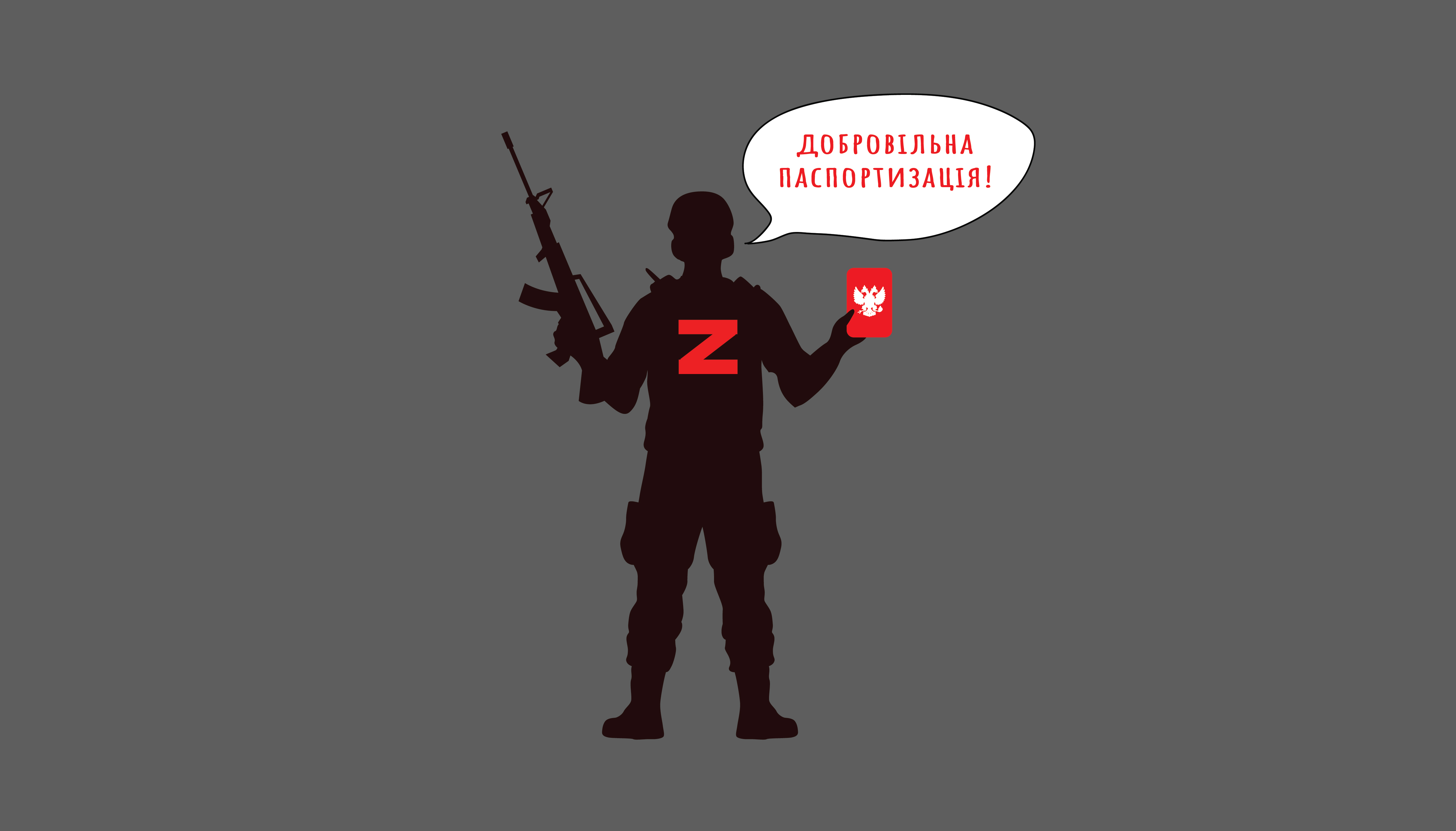Українською читайте тут.
In 2014, Russia started a war against Ukraine, occupying Crimea and parts of the Donetsk and Luhansk regions. At that time, about 44 thousand square kilometers of Ukraine’s territory were occupied. After the outbreak of a full-scale war in 2022, the Russians seized more parts of Donetsk and Luhansk, as well as Zaporizhzhia and Kherson regions, with a total area of about 62,700 square kilometers. In the temporarily occupied territory, the invaders systematically violate human rights, commit various types of crimes, and force people to accept Russian passports through intimidation, blackmail, and false promises. In this article, we focus on the tactics used by the Russians to force people to accept “Russia’s most important document”.
Until the beginning of 2023, Russian passports were being issued in Russian-occupied territories, although at a much smaller scale than in 2023. Passports were issued mainly to active collaborationists, representatives of occupation “authorities,” and fighters of the 1st and 2nd Army Corps of the Russian army (propagandists called them the “DPR” and “LPR” armies). In addition to Russian documents, passports of the made-up “DPR” and “LPR” were also issued.
In 2014, Russia started a war against Ukraine, occupying Crimea and parts of the Donetsk and Luhansk regions. At that time, about 44 thousand square kilometers of Ukraine’s territory were occupied. After the outbreak of a full-scale war in 2022, the Russians seized more parts of Donetsk and Luhansk, as well as Zaporizhzhia and Kherson regions, with a total area of about 62,700 square kilometers. In the temporarily occupied territory, the invaders systematically violate human rights, commit various types of crimes, and force people to accept Russian passports through intimidation, blackmail, and false promises. In this article, we focus on the tactics used by the Russians to force people to accept “Russia’s most important document”.
Until the beginning of 2023, Russian passports were being issued in Russian-occupied territories, although at a much smaller scale than in 2023. Passports were issued mainly to active collaborationists, representatives of occupation “authorities,” and fighters of the 1st and 2nd Army Corps of the Russian army (propagandists called them the “DPR” and “LPR” armies). In addition to Russian documents, passports of the made-up “DPR” and “LPR” were also issued.
Since the beginning of 2023, the invaders have taken steps to sharply increase the distribution of Russian passports to residents of the temporarily occupied territories. This is due to four main reasons:
1. Russian propaganda spreads information about a peaceful settlement of the war and the official consolidation of the occupied territories by Russia. To do this, it is necessary to make it appear that the occupied Ukrainians have accepted Russia and are allegedly voluntarily accepting its passports;
2. To make the occupation appear legitimate, the Russians have scheduled illegal "elections" in the occupied territories for September 10, 2023. Since the "referendums" held by the Russians there in September 2022 looked like nothing more than a sham, the enemy wants to "rehabilitate" itself by holding elections. That is why they need at least half of the local residents to have Russian passports and appear more legitimate in the "elections" than they did in the "referendum." Also, holding "elections" will help the invaders replace unwanted local collaborationists with more loyal ones or even their own people from Russia. Party organizations of four pro-government parties (United Russia, the Communist Party of Russia, the Liberal Democratic Party of Russia, and A Just Russia) are being established in the temporarily occupied territories. The Russian parliament has recently even passed a separate law that allows elections to be held in the territories where martial law has been imposed. Of course, if Russia succeeds in holding "elections," no Western country will ever recognize them, just as it did not recognize previous "pseudo-referendums" and "pseudo-elections."
3. Another purpose of the issuance of passports is the invaders’ desire to control local residents more effectively, to discourage them from helping the Ukrainian Army, and to fight pro-Ukrainian partisans better. The Russians want to legitimize repressions against the residents of the temporarily occupied territories and mobilize them into their army. They also need to maintain order in the newly occupied regions somewhat and set up their own administrative system. This is necessary in order to show local collaborators that "Russia is here forever" and that it will not abandon these territories.
The main tactics used by Russian propagandists to accomplish these tasks are as follows:
1. Intimidation. This tactic is employed both in propaganda threats and in specific actions of the invaders’ authorities in the temporarily occupied territories.
For example, in May 2023, the National Resistance Center reported that the Russian occupation “administrations” in the temporarily occupied parts of the Zaporizhzhia region obliged local residents to renegotiate electricity supply contracts using their Russian “documents” and threatened to cut off electricity if they did not comply with this requirement within a month. The invaders are creating unbearable living conditions for Ukrainians to force them to accept their demands.
They also threaten local residents with the confiscation of cars with Ukrainian license plates in the future, taking away Ukrainian driver’s licenses, vehicle documents, etc. They have already introduced rules that make it impossible to provide medical services and travel outside the settlements without a Russian passport, raising survival concerns for residents of the temporarily occupied territories. The invaders also threaten local residents saying they will take away their children if they do not receive Russian passports, which violates basic human rights.
Until recently, a Russian passport was not required in the parts of the Donetsk and Luhansk oblasts temporarily occupied territories since 2014. But in 2023, the situation changed dramatically, and residents there were forced to obtain Russian citizenship. Employees of public utilities are threatened with being left without pay if they refuse to accept a Russian passport. This even applies to employees of kindergartens.
On April 27, 2023, Russian President Vladimir Putin signed a decree that allows and permits the deportation from the temporarily occupied territories of Ukraine of those residents who do not receive a Russian passport by July 1, 2024.
Ukrainians who remain in the temporarily occupied territories are under a lot of pressure from the invaders to accept Russian passports as soon as possible: this list of threats, blackmail, and intimidation is far from exhaustive.
According to Detector Media, which received information from people under temporary occupation in the villages of the left-bank Kherson region, the invaders have recently threatened local residents who do not have Russian passports with deportation and confiscation of property. The Russians also constantly announce their intention to stop paying pensions to people who have not received a Russian passport. But as of now, payments are still being made.
Until recently, the Russians did not force locals to renounce Ukrainian citizenship when they received Russian citizenship (the legislation of the aggressor country allows dual citizenship). But recently, the situation has changed, and the invaders have been taking steps to encourage and force people to renounce their Ukrainian citizenship. According to Detector Media, which received information from people under temporary occupation on the left bank of the Kherson region, Russians sometimes deface the Ukrainian documents of local residents, but such cases are rare.
Russian legislation was even amended to simplify the process of renunciation of Ukrainian citizenship. At the end of April 2023, the Telegram channels of the so-called Russian “local authorities” launched a challenge called “Marathon of Principles,” where local collaborators demonstratively forfeit their Ukrainian passports and say that they are “going with Russia to a brighter future.” Coercive methods are combined with propaganda and encouragement in this case.
Russian propaganda does not report on methods of influence that use force, but they do exist in the real world. Exclusively on the ground and with the help of law enforcement agencies and illegal pro-Russian “local authorities.”
2. Closing the door. The Russian invaders use this tactic in a slightly modified form: they begin by creating problems for people, and then they allegedly solve them.
They do not promise anything extraordinary but advertise the same social benefits and services that locals had in Ukraine before the temporary occupation: childbirth payments (the so-called “maternity capital” in Russia), unemployment benefits, disability pensions, etc. As “advantages” of the Russian passport, propagandists also cite general human rights such as free choice of employment or admission to higher education institutions on a state-funded basis.
Another “advantage” is the right to use the Russian online system of public services, “Gosuslugi,” and the system of Multifunctional Centers (analogous to Ukrainian Administrative Service Centers) being built in the temporarily occupied territories. The Russians offer Ukrainians other “advantages,” such as exemption from state fees when applying for a passport (which amounts to as much as 300 rubles or 3 US dollars) and the possibility of getting a passport at home for those with limited mobility.
The propaganda deliberately “forgets” that it was the Russian occupation that deprived most residents of the temporarily occupied territories of their jobs and means of subsistence. Now the invaders are offering people the same thing, only under the Russian flag, presenting it as their achievement.
3. Love bombing. In addition to the stick of intimidation, the Russian propaganda machine also uses a carrot to speed up the issuance of passports to the residents of the temporarily occupied territories.
These include, for example, so-called “housing certificates” that allow them to purchase housing in other regions of Russia. The Russians also stimulate the resettlement of Ukrainians deep into Russia to speed up their assimilation into the Russian population. The invaders also facilitate the resettlement of Russians and representatives of other ethnicities to the temporarily occupied territories of Ukraine in order to assimilate Ukrainians as quickly as possible. Recently, the Mariupol City Council reported that the Russians had relocated 40-50 thousand Central Asians to Mariupol. The Russian government has been using such tactics for several centuries to achieve its goals and exert more control over colonized or occupied territories populated by other ethnic groups.
However, things were far from rosy with housing certificates, as is often the case with Russian handouts. The funds outlined in the certificates can be used to buy housing only in depressed regions of Russia. Also, the occupation “authorities” do not give people a choice of which region to move to, forcing them to areas with generally low levels of economic development. The Russians do not shy away from outright lies: even “top collaborationists” Hennadiy and Olena Shelestenko, former PR specialists of collaborationist Volodymyr Saldo, were deceived with housing certificates.
Detector Media, drawing upon information shared by individuals living under temporary occupation, reports of an additional manipulative tactic employed by the invaders to hasten passport issuance. For those residing on the left bank of the Kherson region and possessing Ukrainian passports, all medical services in Crimea are offered free of charge, encompassing even the most serious and costly procedures. However, the moment an individual acquires a Russian passport, these services shift from being complimentary to chargeable.



